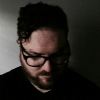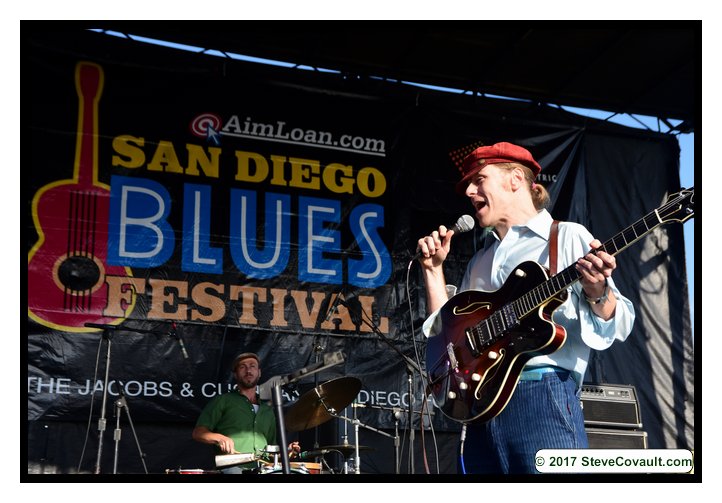Every once in a while, a song comes along that seems to speak to every living cell in your body -- the instrumentation, the melodies, the lyrics -- everything seems to connect to your being like a strip of Velcro that you don't want to peel off. I can count the number of songs I've had that reaction to on one hand. Robert Francis' "Junebug" is one of them.
I was actually turned on to the indie pop singer/songwriter (who headlines the Casbah Wednesday) by SD:Dialed In's Rosemary Bystrak when she was imploring friends not to miss his performance in town a couple years back. I clicked on the official video's link, and before I knew it, the jump down the Internet rabbit hole had left me experiencing a cathartic moment with a beautiful pop tune about a long-lost lover. She's a smart one, that Rosey.
Francis is a curiosity: His music is constantly evolving while still sounding warmly familiar, and it's never been more apparent than on his latest studio album, "Heaven." Released June 3 via Aeronaut Records, the 13-track record is a melting pot of influences and genres: "Emily, I've Been Meaning to Call" had me doing a double-take to make sure Bob Dylan wasn't guesting; "Baby Was the Devil" conjures up Bruce Springsteen, complete with Clarence Clemons-esque sax solos (R.I.P., Big Man). The album wraps up his catchy pop melodicism in an alt-country bow a la Tom Petty ("Take You to the Water") and, on the title track, even tackles the Grateful Dead's sound on 1970's "American Beauty" album.
Following the progression that started with his 2007 debut album, "One By One," 2009's "Before Nightfall" (featuring "Junebug") and 2012's "Stranger in the First Place," "Heaven" settles into a nice groove, with Francis crafting some of his most-memorable and endearing material to date.
SoundDiego
Music. Community. Culture.
I got a chance to speak by phone with the man himself and asked him what's it's like writing pop songs these days, quitting music altogether and the one, lingering relationship that just won't go away.
Dustin Lothspeich: You’re playing here with your new band, the Night Tide, on Wednesday. Any particularly great memories from the Casbah?
Robert Francis: Yeah, I’ve got a few. Even if I haven’t been necessarily playing some of my best shows there, I’ve caught some of my favorite shows at the Casbah before. I saw Charles Bradley there, and he blew my mind. It always feels close to home. I moved to Laguna not too long ago, so oftentimes I’ll go to north San Diego, and surf and spend the day there.
DL: I read that you used to live in Michigan. I spent a couple years there when I was younger and loved it. How was your time there?
RF: I can’t say I was living there so much as I was on an extended stay. I was there for a little over a month or two months. That was a period during my life when I wanted to completely stop playing music. After "Strangers in the First Place," I had been on some tumultuous projectile -- the tour ended in Europe and everyone went home, and instead I flew to Milwaukee. I took the Muskegon Ferry over to Michigan, and I stayed with this girl who I had met one time, and we ended up taking a road trip to [Michigan's] Upper Peninsula, and [I] kept traveling with her for a little while. Once I hit Copper Harbor, which is the most northern part separating Michigan from Canada, I called my manager at the time and told him I wasn’t going to be doing music anymore. We parted ways. I basically resigned. That was actually a time where I was kind of over it.
DL: That must have been tough.
RF: Yeah. I think when I was playing the final show of the tour, we were in Zurich, and I was looking around me onstage -- I was with some of the best session musicians at the time -- and the level of the musicianship was just something else … but there was no connection. All of a sudden, I felt this pain in my heart. I felt like whatever we were communicating wasn’t getting across to the audience. I think it made me want to chase the camaraderie that real bands have. When you’re a hired gun, you’re not as invested in the music. With this band, there’s a palpable feeling that the audience really responds to. We’ve been getting the best reactions from performing live that I’ve ever gotten.

RF: Well, I’d finish writing a song and take it to them, and they’d help me go through it. In the past, "Before Nightfall" was the only record I’d made like "Heaven," where the band has kept me from second-guessing myself and from experimenting too much, and getting too separated from the song. It's really important to work with people who keep you honest and keep you looking after the original intent of the song, or getting too far away from it. They definitely helped with that.
DL: I’m sure it can be tough to stay focused -- you cover a lot of ground, genre-wise on the album, but it's balanced really well. Was that on purpose?
RF: I wish I could say that was my master plan. I dunno ... I just felt like each song we picked as the final songs for the album were the best representations of who I was at that moment. It felt natural. I couldn’t leave any one of those songs off the record.
DL: Do you prefer one style over the others?
RF: It’s hard -- if anything, that’s something that people really like me to deliver ... or my biggest criticism: that I’m all over the place or that I’m not very linear. I love so many types of music, I feel like I could really just go in one direction if I wanted to, but I don’t know if I want to do that. I really love great pop music, I love the blues, I have an affinity for jazz and classical -- there’s all these things that I love; I just can’t pick.
DL: Well, the good thing is you don’t have to. Did you ever feel any pressure to keep putting out singles like "Junebug"?
RF: Yeah, that was part of the reason I had a falling out with Atlantic. They wanted five more "Junebug" songs. It's always nice to hear your song on the radio, but for the most part, I fought so hard for my albums that I don’t want to be a singles-driven artist. For better or for worse, I've sabotaged some parts of my career to fight for the albums themselves.
DL: When you listen back to some of your own songs -- like "Perfectly Yours" or "Love Is a Chemical" -- do you ever think, "These could be huge hits, too!"
RF: For me, those are like songs I would've wanted to hear come on the radio, like if I was at a party or if I was with some girl -- and, yeah, a lot of the songs I write are pop songs at their core. It's hard to straddle the line, though. I feel like it's very easy to write a pop song but it's hard to write a pop song that I'd feel comfortable playing [laughs].
DL: Pop is a bad, three-letter word now [laughs]. Do you ever think about that while writing?
RF: That's always been my worry, and a lot is due to my core group of friends who are hard on me when it comes to my music. They want to see the best out of me. Any time I've sort of leaned toward something more accessible, they're not so nice about it [laughs]. For a long time, I used to really care, but I think I've proven myself and now I feel like I'm comfortable; I'm not worried if I get a bad review or somebody didn't like something. I don't have that fear anymore.
DL: One of the best songs on the new album is "Emily, I’ve Been Meaning to Call," which has a big Bob Dylan flavor to it. Was he a reference?
RF: I'm a huge Dylan fan, so I'm sure it snuck in there somewhere. The original version of that song was more in line with something off of Brian Eno's "Another Green World" album -- and as we were mixing the record, I decided to strip everything away and then go record it like how it is on the album. That was just the purest delivery of the song. It was kind of an afterthought, but that's one of my favorite tracks on there.
DL: Do you ever know what you're writing about as it's happening, or is it something you reflect on later?
RF: When writing, so much of it is stream of consciousness and capturing a feeling as it comes into you; using your pen to bottle it up and put it into a song. When it hits, it hits. I'm not even aware of what I'm doing during most of the duration of creating the song. A lot of songs, I'll finish it and look back and reflect on what I’ve just written, and because it came from within, I don't necessarily have the ability to interpret what I just did.
DL: There is a pretty constant theme of relationships that end badly. Are girls just breaking your heart left and right, or what? Should we be worried about you?
RF: [Laughs] I don't know! I would have never done this in the first place had I not gone through this one relationship, which opened up that songwriting part of my heart and brain. It made a world of difference. That's what helped me to write in the first place. My second record, "Before Nightfall," was written mainly about that relationship. "Strangers in the First Place" was written differently -- those songs were active attempts to write poetry and see what comes, and put it down. But they're mostly about that one relationship -- all the other relationships have orbited that one.
DL: Do the women in your life ever get worried that you keep writing about that one relationship?
RF: Uh, yeah [laughs]. I wish I could say they weren’t worried … but they are [laughs].
Robert Francis & the Night Tide headline the Casbah on Wednesday, with Vikesh Kapoor and Maxim Ludwig opening. Tickets are $10 and available online here.

Dustin Lothspeich plays in Old Tiger, Chess Wars and Boy King. Follow his updates on Twitter or contact him directly.




